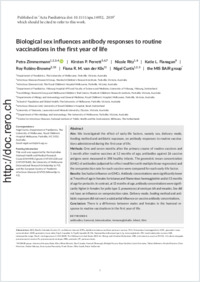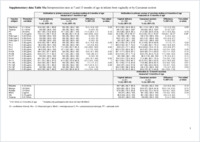Biological sex influences antibody responses to routine vaccinations in the first year of life
- Zimmermann, Petra - Department of Paediatrics, Fribourg Hospital HFR and Faculty of Science and Medicine, University of Fribourg, Switzerland, Department of Paediatrics, The University of Melbourne, Parkville, Victoria, Australia - Infectious Diseases Research Group, Murdoch Children's Research Institute, Parkville, Victoria, Australia - Infectious Diseases Unit, The Royal Children's Hospital Melbourne, Parkville, Victoria, Australia
- Perrett, Kirsten P. Food Allergy Research Group and Melbourne Children's Trial Centre, Murdoch Children's Research Institute, Parkville, Victoria, Australia - Departments of Allergy and Immunology and General Medicine, Royal Children's Hospital, Melbourne, Parkville, Victoria, Australia - School of Population and Global Health, The University of Melbourne, Parkville, Victoria, Australia
- Ritz, Nicole Department of Paediatrics, The University of Melbourne, Parkville, Victoria, Australia - Infectious Diseases Unit, University of Basel Children's Hospital, Basel, Switzerland
- Flanagan, Katie L. University of Tasmania, Launceston and Monash University, Clayton, Victoria, Australia
- Robins-Browne, Roy Infectious Diseases Research Group, Murdoch Children's Research Institute, Parkville, Victoria, Australia - Department of Microbiology and Immunology, The University of Melbourne, Parkville, Victoria, Australia
- Klis, Fiona R. M. van der Centre for Infectious Diseases, National Institute of Public Health and the Environment, Bilthoven, The Netherlands
- Curtis, Nigel Department of Paediatrics, The University of Melbourne, Parkville, Victoria, Australia - Infectious Diseases Research Group, Murdoch Children's Research Institute, Parkville, Victoria, Australia - Infectious Diseases Unit, The Royal Children's Hospital Melbourne, Parkville, Victoria, Australia
- the MIS BAIR group
-
2019
Published in:
- Acta Paediatrica. - 2020, vol. 109, no. 1, p. 147-157
English
Aim We investigated the effect of early-life factors, namely sex, delivery mode, feeding method and antibiotic exposure, on antibody responses to routine vaccinations administered during the first year of life. Methods One and seven months after the primary course of routine vaccines and 1 month after routine vaccines at 12 months of age, antibodies against 26 vaccine antigens were measured in 398 healthy infants. The geometric mean concentration (GMC) of antibodies (adjusted for effect modifiers with multiple linear regression) and the seroprotection rate for each vaccine were compared for each early-life factor. Results Sex had an influence on GMCs. Antibody concentrations were significantly lower at 7 months of age in females for tetanus and filamentous haemagglutinin and at 13 months of age for pertactin. In contrast, at 13 months of age, antibody concentrations were significantly higher in females for polio type 3, pneumococcal serotype 6A and measles. Sex did not have an influence on seroprotection rates. Delivery mode, feeding method and antibiotic exposure did not exert a substantial influence on vaccine antibody concentrations. Conclusion There is a difference between males and females in the humoral response to routine vaccinations in the first year of life. MIS BAIR group: Veronica Abruzzo, Katie Allen, Rhian Bonnici, Dan Casalaz, Hannah Elborough, Bridget Freyne, Kaya Gardiner, Susie Germano, Tobias Kollmann, Nicole Messina, Clare Morrison, Helder Nakaya, Anne Louise Ponsonby, Frank Shann, Mike South, Peter Vuillermin
- Faculty
- Faculté des sciences et de médecine
- Department
- Master en médecine
- Language
-
- English
- Classification
- Medicine
- License
- License undefined
- Identifiers
-
- RERO DOC 327435
- DOI 10.1111/apa.14932
- Persistent URL
- https://folia.unifr.ch/unifr/documents/308255
Other files
Statistics
Document views: 68
File downloads:
- zim_bsi.pdf: 201
- zim_bsi_sm.pdf: 68

